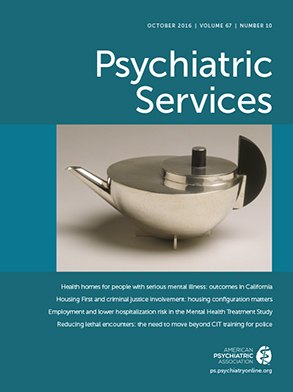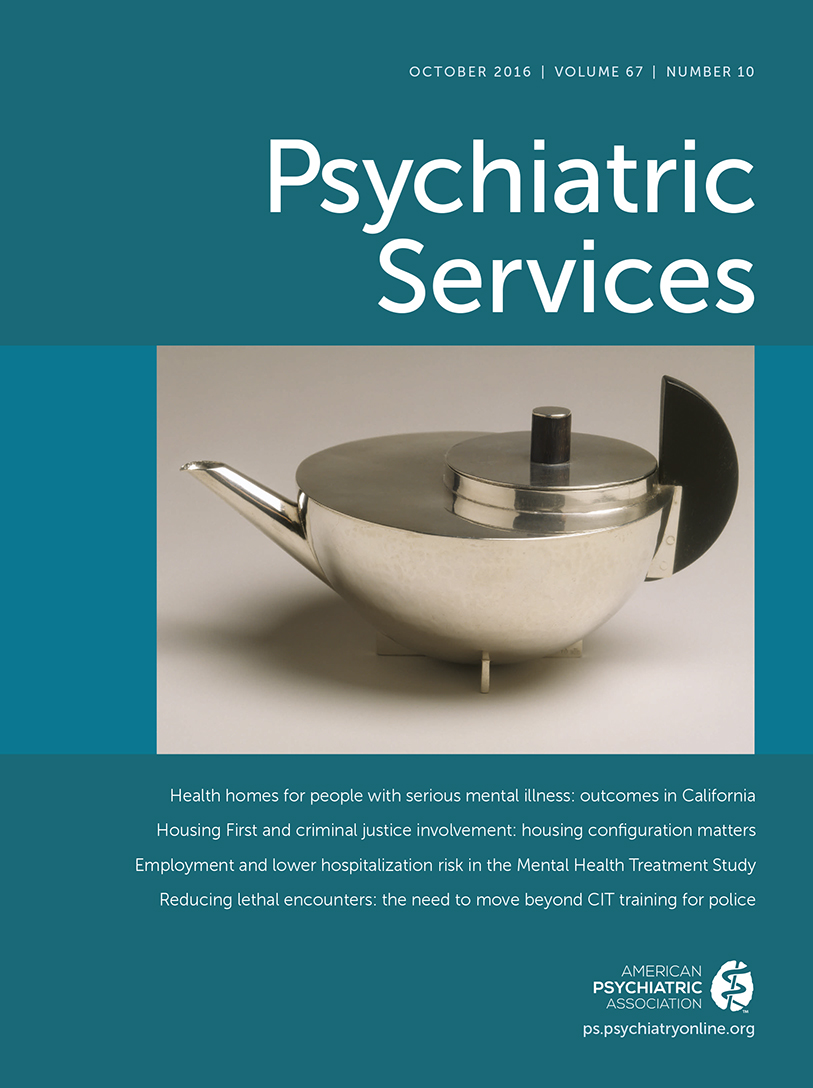In the United States, 35% of adults meet criteria for obesity, and in psychiatric populations, the burden of obesity is 1.5–3 times higher (
1,
2). In 2004 the American Diabetes Association, American Psychiatric Association, American Association of Clinical Endocrinologists, and North American Association for the Study of Obesity released joint recommendations that psychiatrists prescribing second-generation antipsychotic medications use the body mass index (BMI) to screen all patients for obesity and frequently monitor patient weight (
3). However, there is no official consensus about BMI screening and monitoring of psychiatric patients who are not taking these medications. Further, there are no official guidelines for psychiatrists to counsel patients or refer them for weight management.
Few psychiatrists report receiving training on how to treat patients with obesity, and most of the psychiatrists who have received training perceived it to be inadequate (
4). Only one study could be identified that assessed the provision of obesity treatment by psychiatrists in the United States, which found that from 1992 to 1999 preventive medical services (including weight management counseling) were provided or offered during only 11% of outpatient psychiatry visits with patients who had a severe mental illness (
5). Although informative, this study did not focus on obesity, was limited to patients with serious mental illness, and used data prior to the 2004 joint recommendations for psychiatrists prescribing second-generation antipsychotic medications (
3). This study aimed to update and expand the literature on the obesity treatment practices of psychiatrists in the United States.
Methods
Data came from the 2005–2010 National Ambulatory Medical Care Surveys (NAMCS) conducted by the National Center for Health Statistics. The study first sampled all 7,309 visits in the NAMCS data sets with persons 18 years and older who were seen by a psychiatrist. Most of these visits (81%) occurred in a private practice setting. Visits were then excluded if they did not include BMI data (to determine patient obesity). In the final sample of visits that included BMI data, the study used three binary variables to capture psychiatrists’ self-report on whether they performed three types of counseling (diet or nutrition, exercise, and weight reduction) in the visits.
Patient-level counseling predictors were assessed, including patient age, gender, race, expected source of payment, primary psychiatric diagnosis, whether the patient met the criterion for obesity (BMI ≥30.0 kg/m
2), and whether the patient had a prescription for an antipsychotic medication. A patient’s primary psychiatric diagnosis was coded by the reporting psychiatrist by using the
International Classification of Diseases, Ninth Revision (
ICD-9) (
6). A new binary variable was created for the study to indicate whether the visit include an antipsychotic medication order. Each visit record included eight medication fields that were searched for the following medications: chlorpromazine, haloperidol, perphenazine, fluphenazine, clozapine, risperidone, olanzapine, quetiapine, ziprasidone, aripiprazole, and paliperidone. If any of these medications appeared in the record, the visit was coded as including an antipsychotic medication order. Three visit characteristics were assessed as potential counseling predictors: whether the visit was with a new or returning patient, the visit length, and whether the patient saw a nurse or physician assistant. Three practice-level predictors were assessed: geographic region, use of a partial or full electronic medical record (EMR), and practice type (private independent or group practice versus nonprivate).
Multivariable logistic regression was used to examine the independent relationships between the predictor variables and counseling outcomes. To account for provider-level clustering of visit data, hierarchical logistic modeling was used with a unique provider code assigned to each psychiatrist that was entered as the repeating subject. All analyses were performed with SAS statistical software, version 9.3.
Results
From the initial sample of 7,309 visits, 879 (12%) included body weight data, and 657 (9%) included both body weight and height data with which to calculate BMI. The 6,652 (91%) visits without BMI were excluded. As shown in the online supplement to this report, visits were more likely to include BMI data if they occurred during visits with patients classified by their psychiatrist as having obesity, occurred in a practice using a full or partial EMR, and included a nurse or physician assistant (p<.05). In addition, patients with a primary diagnosis of schizophrenia or other psychosis were more likely to have their BMI measured, whereas patients who were expected to pay for the visit out of pocket were significantly less likely to have their BMI measured (p<.05). Visits with a patient who was receiving an antipsychotic medication and visits with a psychiatrist who considered him- or herself to be the patient’s primary care provider were not more likely to include BMI measurement.
In the final sample of 657 visits with BMI data, 60% (N=396) of the patients were female, 85% (N=558) were Caucasian, 39% (N=259) had private insurance, 47% (N=308) had an affective primary diagnosis, and 30% (N=197) had a BMI indicating obesity. The mean±SD patient age was 46±15 years, and the mean visit length was 34±18 minutes. Sixty-two percent of visits (N=406) occurred in a practice without an EMR, and only 3% (N=18) were with a psychiatrist who considered him- or herself to be the patient’s primary care provider. The visits were geographically diverse; 35% (N=228) occurred in the Northwest, 23% (N=150) in the Midwest, 24% (N=155) in the South, and 19% (N=124) in the West.
In the sample of 657 visits with BMI data, 17% (N=110) included exercise counseling, 11% (N=71) included weight reduction counseling, and 19% (N=128) included diet or nutrition counseling. Among the 197 visits with patients who had BMI-documented obesity, 16% (N=32) included exercise counseling, 22% (N=43) included weight reduction counseling, and 24% (N=47) included diet or nutrition counseling.
As shown in
Table 1, compared with patients who were not obese, patients with obesity were more likely to receive diet or nutrition counseling (p<.01) and weight reduction counseling (p<.01) but not exercise counseling. Compared with patients with private insurance, Medicaid patients were more likely to receive all forms of counseling (p<.05), and black patients (compared with whites) were significantly less likely to receive any form of counseling (p<.05). Visits occurring in a practice with a full or partial EMR were significantly less likely to include any form of counseling (p<.05). Visits that included an antipsychotic medication order were more likely to include counseling on exercise (p<.01) but not the other types of obesity counseling. Visits including a nurse or physician assistant were more likely to include exercise counseling (p=.04) but not the other types of obesity counseling. Geographic region was strongly associated with provision of exercise counseling; visits in the Midwest (p<.01) and West (p=.02) were over five times as likely to include exercise counseling as visits in the Northeast. Factors not independently associated with any form of counseling included patient age, gender, diagnosis, length of the visit, whether the patient had been seen before, and whether the visit occurred in a private practice.
Discussion
This study revealed a high rate of BMI-documented obesity, yet low rates of BMI measurement and counseling during psychiatry visits in the United States. The results can be compared with a prior analysis of 2005–2006 NAMCS data, which found that 50% of visits with primary care or cardiovascular specialists included BMI screening and 37% of patients with obesity were provided with counseling on diet and nutrition, exercise, or weight reduction (
7). Therefore, psychiatrists may be performing similarly to primary care and cardiovascular specialists in providing weight management counseling, despite lack of clear counseling guidelines for psychiatrists.
Presence of obesity, source of payment, and race were the strongest patient predictors of counseling provision. Patients with obesity were more likely to receive diet or nutrition and weight reduction counseling but not exercise counseling. Exercise is recommended for psychiatric patients without obesity, and often as a general wellness guideline, which may make it more difficult to find a group difference (
8). However, the rate of exercise counseling was low (16%) for patients regardless of obesity status. Medicaid visits were more likely to include all forms of obesity counseling, which may be due to the stronger Medicaid coverage for obesity treatment compared with private plans (
9). Black patients were less likely to receive any form of obesity-related counseling, which is likely amplifying the racial health disparities reported in the literature (
10).
Visits occurring in practices that use a full or partial EMR were less likely to include provision of any form of counseling. We suspect that these EMRs included clinical reminders for care within the more traditional scope of psychiatric practice (such as depression screening), leaving little time or prioritization for obesity care. Unexpectedly, visits that included an antipsychotic medication order were more likely to include exercise counseling but not diet and nutrition or weight counseling. It is possible that psychiatrists performed annual obesity counseling rather than obesity counseling at each visit. However, new patients were not more likely to be counseled than returning patients, suggesting that the 2004 guidelines for the monitoring of patients taking second-generation antipsychotic medications were not being widely implemented (
3). Also, exercise counseling was the least provided type of counseling to patients with obesity, and geographic region was strongly related to the provision of exercise counseling, suggesting possible cultural influences on psychiatrist attitudes about exercise recommendations.
Overall, this analysis suggests that there is a need to improve psychiatrists’ obesity counseling. Prior research has found that psychiatrists are less likely than pediatricians and internists to feel competent in measuring BMI, discussing risks of obesity, and helping patients set lifestyle goals (
11). As has been successful in primary care, improving the weight management training of psychiatrists may be an important strategy to improve weight outcomes of psychiatric patients (
12). In addition, colocating general medical and psychiatric care and implementing systems interventions that have been effective in primary care may improve the weight management care provided to psychiatric patients. However, the field of psychiatry likely needs tailored or unique solutions for psychiatric settings, many of which lack EMRs and support staff to perform patient health education. In addition, even within primary care, providers still face barriers to obesity counseling (limited time and competing demands) (
13). Technology-assisted interventions have shown promise in facilitating weight loss and addressing barriers to weight reduction counseling yet have not been thoroughly tested in psychiatry (
14).
Study limitations included data collection via self-report, which is susceptible to misreporting. The cross-sectional study design precludes conclusions about causal relationships between predictor variables and outcomes. Most visits occurred in a private practice setting, and the results may not generalize to public mental health clinics.
Conclusions
Most outpatient psychiatry visits in the United States do not include measurement of patient BMI or weight management counseling. Improving the weight management training of psychiatrists and integrating primary care staff in psychiatric outpatient treatment settings would likely improve the care of psychiatric patients with obesity. Technology-assisted interventions for weight management require further testing in psychiatry. Additional research is needed to understand and intervene for the racial disparities in obesity care provided by psychiatrists in this study.

